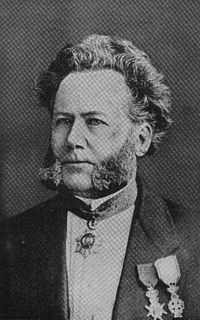Difference between revisions of "Henrik Ibsen"
DavidB4-bot (Talk | contribs) (→top: clean up & uniformity) |
(Father of prose drama) |
||
| Line 1: | Line 1: | ||
[[Image:HenrikIbsen.jpg|thumb|right|200px]] | [[Image:HenrikIbsen.jpg|thumb|right|200px]] | ||
| − | '''Henrik Ibsen''' (20 March 1828 – 23 May 1906) was a Norwegian [[playwright]] whose dramatic works are considered to have inspired the modernist theater movement. He dealt with then-touchy social issues such as political corruption and sexually-transmitted diseases. | + | '''Henrik Ibsen''' (20 March 1828 – 23 May 1906) was a Norwegian [[playwright]] whose dramatic works are considered to have inspired the modernist theater movement. He dealt with then-touchy social issues such as political corruption and sexually-transmitted diseases. He is widely regarded as the father of prose drama, although some of his earlier plays, such as "Peer Gynt", were written in poetic form. |
Perhaps his best known work is ''A Doll's House'' (1879) which is considered one of the earliest examples of [[feminism]] in written theater.<ref name=Fortier>Fortier, Mark (2002), ‘Theory/Theatre: An Introduction’, 2nd Ed, Routledge, Oxon.</ref> | Perhaps his best known work is ''A Doll's House'' (1879) which is considered one of the earliest examples of [[feminism]] in written theater.<ref name=Fortier>Fortier, Mark (2002), ‘Theory/Theatre: An Introduction’, 2nd Ed, Routledge, Oxon.</ref> | ||
Revision as of 15:38, July 11, 2019
Henrik Ibsen (20 March 1828 – 23 May 1906) was a Norwegian playwright whose dramatic works are considered to have inspired the modernist theater movement. He dealt with then-touchy social issues such as political corruption and sexually-transmitted diseases. He is widely regarded as the father of prose drama, although some of his earlier plays, such as "Peer Gynt", were written in poetic form.
Perhaps his best known work is A Doll's House (1879) which is considered one of the earliest examples of feminism in written theater.[1]
- This man Torvald treats his wife like she was his plaything. He lavishes all sorts of exepensive gifts on her, like every day was Christmas. Finally she just can't stand any more. (as described on The Donna Reed Show)
Another influential work, Hedda Gabler (1890) featured an unhappily-married protagonist who steals a drunken writer's manuscript and provides the weapon by which he commits suicide (current advertising on the New Times radio station WQXR describes this character in glowing, positive terms).
References
- ↑ Fortier, Mark (2002), ‘Theory/Theatre: An Introduction’, 2nd Ed, Routledge, Oxon.
